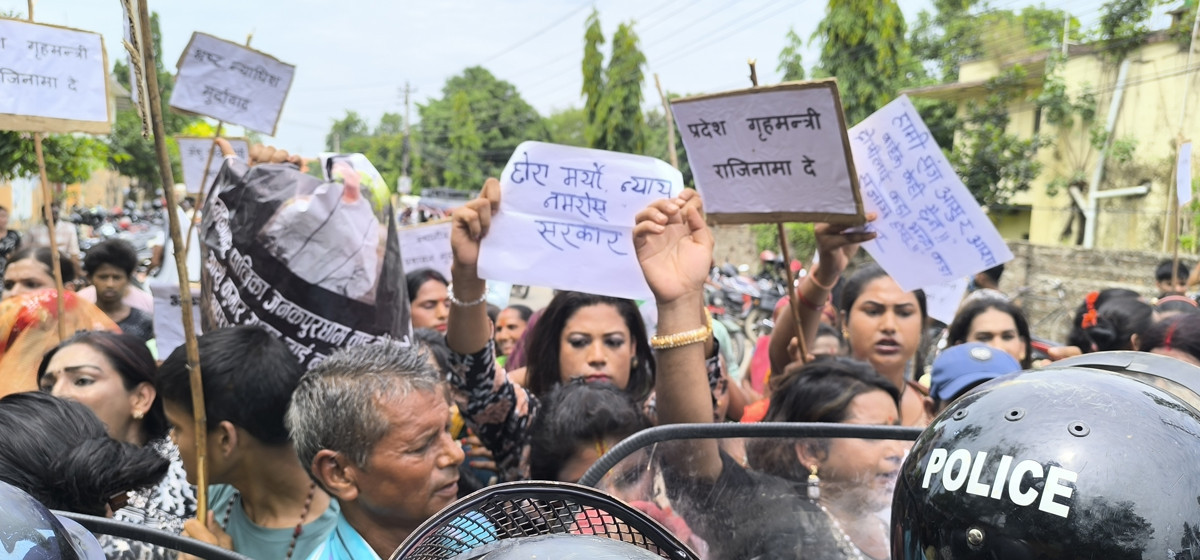KATHMANDU, Jan 9: A 50-year-old Sanak Chaudhary (name changed) from Nepalgunj belongs to a sexual and gender minority group. Until five years ago, he earned a living by driving rickshaws. Five years ago, he was diagnosed with HIV/AIDS. He has been taking medicine for five years.
His life changed a lot after he was infected with HIV. He left his previous job of pulling a rickshaw. His wife also left him four years ago. His HIV-infected friend who lives with him buys everyday essentials through daily wages.
He said, “I didn't know that I had such a disease. I only came to know after being examined by the Nepal Blue Diamond Society.”
A 60-year-old Milan Chaudhary (name changed) from Bardiya is also a sexual minority. He was also diagnosed with HIV infection five years ago.
He said, “I didn't think I would live.” He had many problems like allergies and fever. After treatment, his health has now somewhat improved. He is now taking regular anti-HIV medication. His wife also left him after having an HIV infection. He now lives with a friend like him. Sometimes they visit home, stay for two or four days and return. Both Sanak and Milan have become physically weak due to the HIV infection. They also lack enough money for food.
“We have to earn and eat; we don't have money for plenty of food,” he said, “After having a health infection, life has no meaning,” Chaudhary said.
Nepal to host historic int’l tourism conference for sexual and...

Pramila Kafer and Manoj Mandal, two members of the gender and sexual minority of Mahottari make a living as sex workers. After realizing that they belonged to a sexual minority group, they left the village because there was not a suitable environment for them to sustain in the village. As there was no way to make a living in the city, they chose to become sex workers. Though this profession was not safe for their health, there was no other alternative.
“After learning that we belonged to the sexual minority, the villagers didn’t let us stay in the village. We are forced to live as sex workers,” said Manoj Mandal of Mahottari. He said that by adopting this profession, they are at the risk of HIV every day.
Most of the customers who come to visit them do not obey their instructions. “Some leave without paying a single penny, some don't agree to use contraceptives,” he said. Around six friends who are working as sex workers while living in the city are already infected with HIV. He said that even though they knew this, they had to continue as sex workers because there was no other option. “I am not educated and there are no job opportunities in the market as we belong to sexual minority communities,” Kafar said.
Apart from these representatives, there are many HIV-infected people in the gender and sexual minority communities. According to Nepal Blue Diamond Society, 6.8 percent of the population has HIV infection among gender and sexual minorities. In Nepal, 0.02 percent of the total population is infected with HIV.
According to President of Mitini Nepal, Laxmi Ghalan, apart from HIV, sexually transmitted diseases such as gonorrhea and non-communicable diseases like high blood pressure, diabetes, and other diseases are common in sexual and gender minorities. Gender and sexual minorities are suffering from complex diseases as they use random hormones without a doctor's recommendation while they are transforming their gender.
In Nepal, gender and sexual minorities want to have gender-affirming surgeries, but they are deprived of these treatments due to the lack of advanced treatment in Nepal. In such a situation, they have faced complex problems as they take hormone pills without expert advice.
According to Prakash Niraula, head of the Health Department of Blue Diamond Society, the rate of HIV and sexually transmitted diseases is high among gender minorities.
After leaving home, they feel independent in the city for their identity but there is no way for them to earn a living. Due to the lack of education, they do not get good jobs, and due to social stigma, same-sex marriages have not been widely accepted. This is the reason why they are forced to engage in sex trade after not having other alternatives. At the same time, they are at high risk of HIV infection.
“The rate of HIV infection among gender and sexual minorities is high in Nepal, compared to sex workers in other countries,” said Niraula. According to him, the status of safe sex has improved among other sex workers, but unsafe sex is still at a high rate in this community. Niraula said that because of having unnatural sexual relations, HIV spreads quickly among them. HIV as well as severe sexually transmitted diseases such as syphilis and gonorrhea are also more common in this group.
Ghalan said that as the health workers and health institutions misbehave with them during treatment, they are less likely to seek treatment services.
Especially, when it comes to hysterectomy for trans men, health institutions seek male spouses as guardians. In the case of spouses, trans men themselves pose as guardians.
Ghalan said that sex workers from gender and sexual minorities who leave their homes and enter the city are deprived of health services in times of illness when health institutions seek guardians. “Most of them have left home and don’t have a guardian,” she said.
According to Ghalan, when someone is biologically female and visits a health institution as a male, a document with gender identity is sought. In such a situation, there are more legal complexities.
She said that even though the government has mentioned inclusion in the law, it has not yet been implemented in practice. But there are many cases where treatment is halted due to the lack of money and guardians during major operations.
Due to high cost and lack of safe healthcare, the number of gender-affirming operations is extremely low. She said that sexual minorities have been deprived of their right to privacy due to the government policies while seeking identification.






































